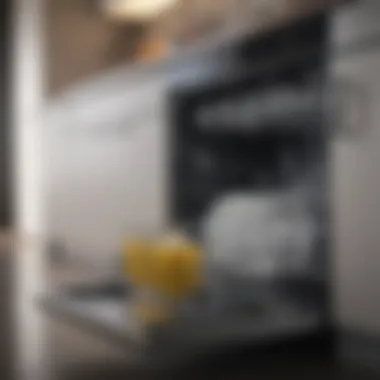Natural Ways to Clean Your Dishwasher Effectively


Intro
Keeping a home clean and efficient is a task that, while often mundane, holds deeper significance in our day-to-day lives. One of the appliances that can easily be overlooked yet is pivotal in maintaining kitchen hygiene is the dishwasher. Misunderstood as a mere utility, it instead acts as a silent guardian of cleanliness. Yet, just like any tool, its effectiveness can diminish over time if proper care isn’t taken.
The focus of this article centers on natural cleaning methods for dishwashers, steering clear of harsh chemicals that may not only be detrimental to the appliance but could also permeate our living spaces. A dishwasher should help simplify life, rather than complicating it with toxic residues. Understanding how to maintain this appliance naturally can lead to improved efficiency and a healthier kitchen environment.
By utilizing ingredients that can mostly be found in your pantry, maintaining your dishwasher becomes an approachable and eco-conscious task. This article will unravel various methods for keeping your appliance in peak condition and ensure it continues to serve its purpose without wearing out the welcome mat.
Why Natural Cleaning?
When it comes down to it, the power of nature often has more upsides than the harsh chemicals found in commercial cleaners. Here are a few reasons why natural cleaning should be on your radar:
- Safety: Using natural substances like vinegar and baking soda minimizes exposure to dangerous chemicals.
- Effectiveness: Many natural ingredients have antibacterial properties and can dissolve grease effectively.
- Cost-Effective: Most of these ingredients are affordable and often already available at home.
In the following sections, we will delve into the specific methods you can employ for keeping your dishwasher clean and efficient. This guide will serve not only as a resource but also as a gentle reminder to rethink how we approach cleanliness in our kitchens.
Understanding the Need for Regular Dishwasher Cleaning
Keeping a dishwasher clean might seem like a trivial task in the grand scheme of household maintenance, but neglecting this appliance can lead to a plethora of issues that go beyond just unsightly stains. Dishwashers are a cornerstone in most kitchens, providing not only convenience but also promoting hygiene by effectively sanitizing our dishes. Without regular cleaning, these machines can become breeding grounds for mold, unpleasant odors, and inefficiencies that can lead to costly repairs down the line. Here’s why it’s important to dedicate some time to maintaining your dishwasher.
Why Clean Your Dishwasher?
The significance of cleaning your dishwasher goes beyond mere aesthetics. Here are several key reasons:
- Hygiene: Food particles and grease can build up within the machine, creating a haven for bacteria to multiply. This can compromise the hygiene of your cookware and utensils, ultimately affecting your health.
- Efficiency: A clean dishwasher operates more efficiently. Clogs and residue can hinder water flow, making the appliance work harder to achieve the same cleaning results, which can spike your energy bill.
- Longevity: Regular maintenance can help prolong the lifespan of your dishwasher. Just like any other appliance, performing occasional cleanings can prevent wear and tear that leads to breakdowns.
Ultimately, a well-maintained dishwasher means cleaner dishes and a smoother operation for years to come.
Signs That Indicate Your Dishwasher Needs Cleaning
Being attuned to the signals your dishwasher sends can save you headaches in the long run. Here are some signs that might indicate it’s time for a thorough cleaning:
- Unpleasant Odors: If you notice musty or rotten smells wafting from your appliance, there's a good chance that food particles are trapped somewhere inside.
- Spotty Dishes: When dishes come out of the wash looking more like a science experiment than clean, it's a clear sign that your dishwasher may be struggling due to clogged jets or filters.
- Water Pooling: If you find water pooling at the bottom of your dishwasher after a cycle, this could indicate a blockage that needs to be addressed quickly.
Regular attention to these signs can make a world of difference—not only in your appliance's performance but also in the safety of your dining experience.
By understanding these basic aspects of dishwasher maintenance, you position yourself to embrace a healthier, more efficient kitchen environment. This foundation is essential as we delve deeper into natural approaches for cleaning your dishwasher.
The Drawbacks of Chemical Cleaners
When it comes to cleaning, many people instinctively reach for commercial chemical cleaners. These products, while seemingly effective, bring along a host of concerns that merit a second glance. This section delves into the drawbacks of these cleaners, focusing on both health-related risks and their environmental impact. As more individuals become aware of the potential hazards lurking in their cupboards, the conversation around finding safer alternatives grows louder.
Health Risks Associated with Chemical Residue
Household cleaners often contain a cocktail of synthetic chemicals. Even after rinsing, residues can linger, especially in appliances like dishwashers. When you run a cycle, traces of these substances may end up on your dishes, posing potential health risks. The body at times unknowingly ingests them, which can lead to allergic reactions or even long-term health issues for sensitive individuals.
A study has shown that frequent exposure to such chemical residues can contribute to respiratory problems. Ingredients like phosphates can irritate airways, creating an uncomfortable experience during meals. Consider this: food allergies are on the rise, especially among children. Could the cleaners we use be playing a role?
"Living in a house full of toxic fumes is no way to enjoy your meal."
Many may think that simply ensuring dishes are thoroughly rinsed will do the trick, yet that’s often easier said than done. It’s common for families to grab a plate from the dishwasher in haste, bypassing proper rinsing. Repeated exposure increases the chances of unexpected reactions. It’s prudent to consider alternatives that don’t carry such risks.
Environmental Impact of Chemical Cleaners
Beyond personal health, there’s also an environmental elephant in the room. Chemical cleaners often end up in the water supply, contributing to pollution. When these products wash down the drain, they can disrupt local ecosystems, harming aquatic life and impacting water quality.
The synthetic compounds found in many cleaners don’t break down easily, leading to long-lasting pollution. This could be likened to tossing a rock into a pond – the ripples extend far beyond the initial splash. Over time, these accumulated toxins can infiltrate our drinking water, becoming a concern for public health.


Moreover, the production and packaging of these cleaning products contributes to a larger waste problem. Plastic containers, chemical extraction practices, and harmful manufacturing processes have significant repercussions on the environment. It raises an important question: is it really necessary to trade health and sustainability for convenience?
In summary, chemical cleaners can have profound effects not only on personal well-being but also on the environment at large. As we reflect on these points, it becomes clear that exploring natural cleaning solutions is more than a trend; it's an important shift towards healthier homes and a more sustainable planet.
Introducing Natural Cleaning Solutions
In recent years, as awareness about health and environmental sustainability has grown, many people have turned their gaze towards natural cleaning solutions. Especially for appliances like dishwashers, which play a crucial role in our households, opting for natural methods presents a holistic approach towards cleanliness and efficiency. One should consider the importance of these natural alternatives—it’s not just about cleaning, it’s about maintaining a safe and healthy environment for our families.
Using natural ingredients can reduce exposure to harsh chemicals and keep the dishwasher free from harmful residues. Moreover, these solutions tend to be more affordable and often just as effective, if not more so, than their chemical counterparts. Interestingly, natural cleaners can also be multifunctional. For instance, a simple vinegar solution cleans, sanitizes, and deodorizes, making it a trio of benefits wrapped in one bottle.
Effective Ingredients for Natural Cleaning
Vinegar
Vinegar is a powerhouse when it comes to natural cleaning. Known for its acidic properties, it effectively breaks down grease and stubborn food residues. This key aspect contributes largely to its popularity in dishwasher cleaning. When it comes to sanitizing, vinegar neutralizes bacteria and odors, ensuring that your dishwasher functions at its best.
The unique feature of vinegar is its ability to cut through mineral deposits, which can be a common issue in areas with hard water. However, one must exercise caution, as excessive use of vinegar might wear away the rubber seals in the dishwasher over time. Moderation is key in reaping its benefits without any adverse effects.
Baking Soda
Baking soda is another stellar choice in the realm of natural cleaning. This ingredient is known for its gentle abrasiveness, making it effective at scrubbing away buildup without scratching surfaces. It's one of the most beneficial natural cleaners around, as it not only cleans but also deodorizes, giving your dishwasher a refreshed sense of cleanliness.
What sets baking soda apart is its unique ability to neutralize odors. When combined with vinegar, it creates a fizzing action that helps lift grime and debris. One downside might be that it requires a little more effort than some chemical products, as it may necessitate scrubbing or mixing with water for optimal effectiveness.
Lemon Juice
Lemon juice is revered not just for its zesty flavor but also for its cleaning prowess. It's packed with citric acid, which helps to cut through grease and provides a natural antibacterial effect. Lemon juice adds a fresh scent to your cleaning routine, which is a significant aspect of its contribution to this article.
A unique feature of lemon juice is its ability to brighten and remove stains, not just on your dishes, but also within the dishwasher itself. One consideration to keep in mind is that citric acid can be harsh on some metal surfaces over time, so it's best used sparingly in routine cleaning.
How These Ingredients Work
Understanding how these natural ingredients work creates a synergetic approach to keeping your dishwasher clean. When vinegar and baking soda come together, they engage in a chemical reaction that produces carbon dioxide gas, creating bubbles that lift grime off surfaces. Lemon juice, with its acidity, works alongside these ingredients to dissolve any residue or stains left behind.
This combination enhances the cleaning process, allowing dishwashers to operate more effectively while minimizing the need for store-bought cleaners packed with unknown chemicals.
"Embracing natural solutions not only promotes healthier living but also encourages sustainable practices—cleaning can indeed harmonize with our values."
By integrating these natural ingredients into your cleaning routine, one can significantly improve not just the cleanliness of the appliances, but also the overall ambiance of the kitchen.
Step-by-Step Guide to Natural Dishwasher Cleaning
Cleaning your dishwasher may not seem like a top priority, but it significantly influences its performance, longevity, and overall hygiene of your kitchen. This guide will help you understand how to approach this task methodically using natural solutions, improving both efficiency and health standards in your home.
Preparation Before Cleaning
Preparing your dishwasher for a thorough cleaning is essential. It paves the way for effective cleaning and ensures you aren’t missing any vital steps.
Emptying the Dishwasher
Before diving into the cleaning process, emptying the dishwasher entirely is non-negotiable. Think of it as laying the groundwork for a house; you can’t start renovations with clutter in the way. By removing all dishes, you create a clean slate, allowing access to every nook and cranny that needs attention.
One key characteristic of emptying the dishwasher is that you get a clear view of how dirty it is inside. Food debris, grease, and grime often accumulate at the bottom, especially if you haven’t cleaned it in a while. Also, it prevents any items from getting damaged while you're scrubbing away. The unique feature of this step is that it can surface blockages and stains you might not have noticed otherwise. It's a beneficial choice because it allows you to carry out other cleaning steps without hindrance.
Inspecting for Blockages
Next on the list is inspecting for blockages. This step is easy to overlook, but it plays a crucial role in keeping your dishwasher running smoothly. Often, small food particles or debris can cause a major inconvenience by affecting water drainage and cleaning efficiency.
The key characteristic of checking for blockages is being proactive. By inspecting drain openings, spray arms, and filters, you’re essentially troubleshooting potential issues before they escalate into service calls. The unique aspect of this inspection lies in its immediate benefits; removing blockages ensures that your dishwasher gets optimal water flow, resulting in cleaner dishes. Yet, it does require a discerning eye—if you’re not careful, you might miss some pesky food bits lingering about.
Cleaning the Filter
Cleaning the filter is another critical step in the natural dishwasher cleaning process. This part of the appliance often gets neglected but is crucial for optimal performance. The filter traps food debris and grease, so it makes sense to keep it in tip-top shape.


Make it a habit to remove and rinse the filter regularly. Most filters are easily accessible. Simply take it out and rinse it under hot water to flush away the accumulated leftovers. If you notice stubborn residue, a scrub with a soft brush helps to tackle it. The result? Cleaner dishes and a proud dishwasher with a sparkling filter.
Removing Grime and Deposits
Once the preparatory steps are complete, it’s time to tackle the grime and deposits that make dishwashing less effective. This task is best accomplished through a combination of natural cleaning agents, specifically vinegar and baking soda, as well as lemon juice.
Using Vinegar and Baking Soda
Using vinegar and baking soda is a two-pronged approach to keeping your dishwasher pristine. Vinegar works wonders as a natural disinfectant, breaking down grease and dissolving mineral deposits. Meanwhile, baking soda adds a gentle scrub to the mix, ensuring all drudgery is broken down during the process.
The key benefit of this combination is its dual-action nature. Vinegar can neutralize odors while simultaneously providing a deep-cleaning effect, and when baking soda joins the fray, you get a bubbling reaction that helps lift stubborn buildup. It's a popular choice in the realm of natural cleaning methods, largely due to its effectiveness and low cost. However, care should be taken; using too much baking soda can leave a residue if you don’t follow up with a thorough rinse.
Applying a Lemon Juice Solution
Applying a lemon juice solution is another brilliant natural method. Lemon juice is packed with citric acid, which means it's fantastic for cutting through grease and leaving a refreshing scent. It can be especially useful for wiping down the door seals and the interior—areas that can often suffer from buildup due to moisture and food residue.
The uniqueness of lemon juice is that it not only cleans but also acts as a deodorizer. Regularly using it means a fresher smelling appliance, which is advantageous as lingering odors can turn a clean kitchen into a less appealing space. However, take care with the concentration; too much lemon might result in a sour scent that lingers longer than desired.
Final Rinse and Dry
After all the cleaning activities, a final rinse is crucial. This step ensures that all the natural cleaning agents used have been washed away, leaving no residue. Letting the dishwasher run a short cycle with plain water can achieve this, ensuring it’s clean and set for future dish duties.
Drying is equally important. Leaving the door slightly ajar allows for air circulation, reducing the chance of mold and mildew, which could otherwise thrive in the moist environment. This simple action will help maintain the cleanliness achieved through your diligent natural cleaning efforts.
By following these steps, you’re not just cleaning a dishwasher—you’re investing in the longevity of your appliance. The natural cleaning solutions introduced here make the task not only effective but also healthy, elevating your kitchen’s standards.
Maintaining a Clean Dishwasher
Keeping your dishwasher in tip-top shape is a key part of its longevity and performance. Regular maintenance not only enhances efficiency but also ensures that your dishes come out sparkly clean. There’s nothing worse than a smelly dishwasher or one that leaves residue on your tableware. By sticking to a maintenance routine, you can mitigate potential problems before they snowball into major repairs or malfunctions.
When discussing maintaining a clean dishwasher, it’s essential to highlight a few elements:
- Consistency: A regular cleaning schedule can significantly reduce built-up grime.
- Efficiency: A well-kept appliance works smarter, not harder, meaning lower utility bills.
- Hygiene: Regular cleaning also prevents bacteria, mold, and unpleasant odors from taking up residence in your appliance, which is crucial for your kitchen’s health.
Taking a proactive approach here is a game changer. You want to form habits that complement the natural cleaning methods you’ve learned in earlier sections. It’s not just about cleaning; it’s about creating an environment where dirt and gunk are less likely to accumulate.
Regular Cleaning Schedule
Mapping out a regular cleaning schedule is an absolute must. Whether it’s weekly or monthly, finding a rhythm that suits your lifestyle can push your dishwasher’s performance into overdrive. Use the following tips to set a chore schedule:
- Weekly: Run a hot cycle with vinegar to clear away any residues.
- Monthly: Clean the filter and inspect hoses—this keeps things flowing smoothly.
- Quarterly: Check for leaks or unusual noises, addressing them before they escalate.
These quick clean-up tasks take no time at all but save you loads of trouble down the road. Plus, a set routine helps maintain your personal engagement with the appliance, leading to more consistent results.
Tips for Preventative Maintenance
Implementing preventative maintenance can help you avoid unnecessary headaches in the future. A few simple techniques can breathe new life into your dishwasher and extend its life.
Proper Loading Techniques
Loading your dishwasher correctly is a game changer. It affects how well the water and detergent circulate, directly impacting cleaning efficiency.
Key characteristic: Dishes need to be arranged to maximize exposure to the spray arms, ensuring every surface is cleaned.
This is a popular choice for achieving optimal results—when you load it incorrectly, some dishes won’t come out clean, leading to an endless cycle of washing.
Unique feature: Grouping similar items together can enhance water flow. Not only does this assist in cleaning effectively, but it also conserves energy by allowing your dishwasher to work up to its full potential.


The advantage? Less water and energy consumption combined with cleaner dishes; who wouldn’t want that?
Choosing the Right Detergent
Choosing the right detergent plays a vital role in maintaining your dishwasher's effectiveness. Not all detergents are created equal, and going natural is often the best route.
Key characteristic: Many people appreciate detergents that use plant-based ingredients, minimizing chemical exposure.
Natural options are gaining popularity because they are softer on the environment, aligning with our collective interest in sustainability.
Unique feature: Natural detergents typically reduce the risk of toxic residue on your dishes, which is a significant concern many have these days.
However, disadvantage: They may not be as potent against tough stains as some chemical-laden products. Still, many users find that with the right loading and regular cleaning, these types of detergents perform reliably.
In summary, dedicating time to maintaining a clean dishwasher pays off immensely. By forming a proactive routine around loading technique and detergent selection, you set yourself up for success while reducing the impact harsh chemicals might have on your family and the planet.
Troubleshooting Common Dishwasher Problems
Maintaining a dishwasher is not just about cleaning it once in a while. It's also crucial to troubleshoot and address issues as they arise. For homeowners and kitchen enthusiasts alike, understanding how to handle common problems ensures that the appliance runs smoothly. Moreover, regular maintenance can enhance its life span, saving you from the hassle of premature replacements.
Dealing with Foul Odors
A common headache for many is the dreaded foul odor emanating from the dishwasher. This unpleasant situation often arises from food particles or grime stuck in hidden crevices, particularly after a long wash cycle. Addressing this issue promptly is essential; otherwise, it can lead to further buildup and even affect the flavors of clean dishes.
Here are some techniques to eliminate those stubborn smells:
- Baking Soda and Vinegar Combo: Start by sprinkling a cup of baking soda at the bottom of the empty dishwasher and then pouring a vinegar solution into the bottom. Run a short hot cycle. The combination will not only neutralize odors but also help clear away any deposits.
- Check the Drain and Filter: Inspect these areas for trapped food scraps or residues. Cleaning them out can vastly improve the appliance's overall smell.
- Use Essential Oils: A few drops of lemon or tea tree oil can do wonders in freshening the scent while also providing antimicrobial properties.
By routinely checking for and remedying foul odors, you can maintain a fresh-smelling kitchen, enhancing both your cooking environment and overall experience in the heart of your home.
"A clean dishwasher is like a happy home; it radiates freshness and ensures health in every meal served."
Addressing Poor Cleaning Results
Another issue many consumers face is how dishes come out of the dishwasher—spotty, greasy, or simply unclean. This can be frustrating, especially after investing in a reliable appliance. Understanding why this happens is step one towards ensuring your dishwasher performs at its best.
Several factors can contribute to poor cleaning results:
- Blocked Spray Arms: If the spray arms are blocked by food particles or calcium buildup, they won't spray effectively. Periodically removing and cleaning these parts can prove quite beneficial.
- Overloading the Dishwasher: While cramming in dishes might seem like a time-saver, it can lead to ineffectiveness. Ensure that items are arranged properly, allowing more water to circulate around them.
- Improper Detergent Use: Sometimes, the right detergent can make all the difference. It’s worth considering whether you're using the suitable type for hard or soft water.
To remedy poor cleaning results, check the aforementioned areas. Regular maintenance, like cleaning the spray arms and ensuring your loading technique is sound, can better ensure that you get sparkling results after every wash.
Ending: Embracing Natural Cleaning Practices
With the growing awareness about health and environmental sustainability, embracing natural cleaning practices for your dishwasher is no longer just a trend; it’s a necessity. When switching to natural methods, you not only eliminate the risks posed by harsh chemicals but also promote a more eco-friendly lifestyle. This section ties together the core ideas discussed in the article, reinforcing how these practices can lead to a cleaner, safer space in your kitchen.
Natural cleaning solutions, like vinegar and baking soda, are effective at removing grime and lingering odors. Unlike their chemical counterparts, they are gentle on both your appliance and the ecosystems they might affect once they run down the drain. The importance of this transition lies in its dual benefit—it ensures your dishes come out spotless while safeguarding the health of you and your family.
Natural solutions not only effectively clean but can also serve to enhance the longevity of your dishwasher, ultimately saving you money on repairs and replacements.
The Benefits of a Natural Approach
- Cost-Effectiveness: Natural ingredients are often cheaper than commercial cleaning agents.
- Simplicity: Common household items like vinegar and baking soda are easy to find and use.
- Environment and Safety: Your choice not only impacts your home but contributes to a broader ecological balance. Non-toxic cleaners breakdown harmlessly in nature.
By adopting these practices, you also contribute to a more sustainable environment. It’s a win-win scenario that you can feel good about.
Incorporating Natural Solutions into Daily Life
Integrating natural cleaning methods into your routine doesn’t have to be overwhelming. Start small and build your own habits. Here are practical steps to follow that can make a significant impact:
- Routine Maintenance: Make cleaning your dishwasher a part of your monthly chores. Allocate a specific day and stick to it.
- All-Purpose Solutions: Keep a spray bottle of diluted vinegar and water handy. A quick spray after loading can prevent buildup.
- Educate Your Family: Involve everyone in understanding the benefits and processes of using natural cleaners.
Consider setting reminders or notes to help keep the task on your radar. Over time, these natural solutions can blend seamlessly into your household routine.
By investing into natural solutions, you not only ensure a cleaner dishwasher but foster a healthier home and a more sustainable environment. The time to embrace these practices is now—your health and the planet will thank you.







